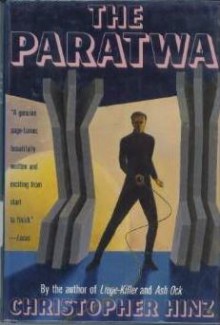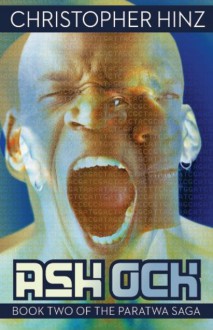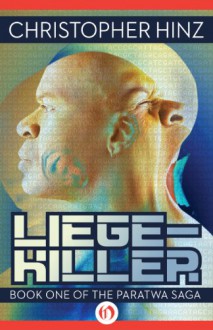
I really liked Liege-Killer, the first book in this trilogy. The pacing was great, and I enjoyed the sci-fi mystery and suspense aspects. Ash Ock, the second book, wasn't as good, but I reminded myself that it was the second book in a trilogy, and Hinz probably needed to do some setup for the events of the third book. Now that I've read the third book, I wish I could go back in time and tell myself to stop at Book 1.
This book was incredibly painful to get through. For long stretches, all anyone seemed to do was sit around and talk. Timmy, Susan's mentor, lectured Susan, Gillian, and Empedocles about Sappho's origins, motives, and plans for almost 100 pages. Information necessary for certain scenes to make sense wasn't revealed for hundreds of pages. For example, the Os/Ka/Loq were mentioned long before they were explained, and the phrase “This kascht reeks of the lacking” was overused before it even meant anything to me.
The other reasons why I didn't like this book are almost entirely enormous spoilers. You've been warned.
The female characters depressed me. Buff was never able to avenge Martha (Gillian did that). Susan, who I had hoped would morph into humanity's ridiculously badass savior, was revealed to have been created solely to make Gillian/Empedocles whole again. She got to resist and rage against this fate for only a few pages. The instant she made physical contact with Gillian, however, she was consumed by what was basically a soulmate bond and happily had sex with him, her love. This was, I think, the first instance I've ever seen of a male author writing a soulmate romantic subplot, and it sucked. Then there was the climactic battle with Calvin KyJy. Although Susan's body got to make the decisive moves, it was Gillian who was in the driver's seat – he got to be the hero via her body. Considering what I had hoped for after Book 2, it was like a slap in the face.
I'm not sure what Hinz wanted readers to feel for Sappho. Pity? Anger? If Calvin KyJy was right, she'd never really loved Ghandi at all and had been using him right from the start to the finish. I felt like vomiting when the form of her partial “tway” was revealed and I realized the significance of Reemul's “toy” in Book 1. It didn't matter that it was an android and probably not even a sentient one at that. It was still horrifying.
Nick's way of “winning” the war against Sappho and the Os/Ka/Loq was insane and left me cold. I did not consider the complete destruction of E-Tech's archives, the deaths of hundreds of people, and the annihilation of all possibility of life on Earth to be a victory. An explanation was given for the Os/Ka/Loq backing off, but it didn't quite work for me. With all the trouble humans had caused, you'd think they'd have happily wiped us all out in exchange for having to wait a few more centuries to have our planet. Goodness knows they had the time.
So yeah. This book didn't work for me. And the “to be continued” feel at the end wasn't intriguing, it was annoying.
(Original review posted on A Library Girl's Familiar Diversions.)

 Log in with Facebook
Log in with Facebook 







